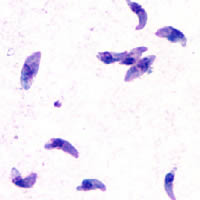
Photo from wikipedia
Toxoplasma gondii is an obligatory intracellular apicomplexan protozoan which can infect any warm-blooded animal and causes severe diseases in immunocompromised individuals or infants infected in utero. The survival and success… Click to show full abstract
Toxoplasma gondii is an obligatory intracellular apicomplexan protozoan which can infect any warm-blooded animal and causes severe diseases in immunocompromised individuals or infants infected in utero. The survival and success of this parasite require that it colonizes the host cell, avoids host immune defenses, replicates within an appropriate niche, and exits the infected host cell to spread to neighboring non-infected cells. All of these processes depend on the parasite ability to synthesis and export secreted proteins. Amongst the secreted proteins, rhoptry organelle proteins (ROPs) are essential for the parasite invasion and host cell manipulation. Even though the functions of most ROPs have been elucidated in the less virulent T. gondii (type II), the roles of ROPs in the highly virulent type I strain remain largely un-characterized. Herein, we investigated the contributions of 15 ROPs (ROP10, ROP11, ROP15, ROP20, ROP23, ROP31, ROP32, ROP33, ROP34, ROP35, ROP36, ROP40, ROP41, ROP46, and ROP47) to the infectivity of the high virulent type I T. gondii (RH strain). Using CRISPR-Cas9, these 15 ROPs genes were successfully disrupted and the effects of gene knockout on the parasite’s ability to infect cells in vitro and BALB/c mice in vivo were investigated. These results showed that deletions of these ROPs did not interfere with the parasite ability to grow in cultured human foreskin fibroblast cells and did not significantly alter parasite pathogenicity for BALB/c mice. Although these ROPs did not seem to be essential for the acute infectious stage of type I T. gondii in the mouse model, they might have different functions in other intermediate hosts or play different roles in other life cycle forms of this parasite due to the different expression patterns; this warrants further investigations.
Journal Title: Frontiers in Microbiology
Year Published: 2017
Link to full text (if available)
Share on Social Media: Sign Up to like & get
recommendations!